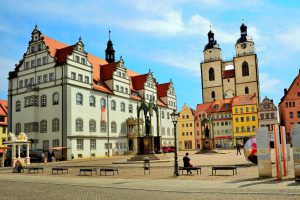Text: Psalm 149
Theme: The Blessings of the Saints
A. In the Name of the Father…Amen.
B. Psalm 149 serves as our sermon text for this morning, which reads as
follows:
(1) Praise the LORD! Sing to the LORD a new song, his praise in the
assembly of the godly!
(2) Let Israel be glad in his Maker; let the children of Zion rejoice in
their King!
(3) Let them praise his name with dancing, making melody to him with
tambourine and lyre!
(4) For the LORD takes pleasure in his people; he adorns the humble with
salvation.
(5) Let the godly exult in glory; let them sing for joy on their beds.
(6) Let the high praises of God be in their throats and two-edged swords
in their hands,
(7) to execute vengeance on the nations and punishments on the peoples,
(8) to bind their kings with chains and their nobles with fetters of iron,
(9) to execute on them the judgment written! This is honor for all his
godly ones. Praise the LORD!
This is the Word of the Lord. Amen.
C. Grace, mercy, and peace be yours from God our heavenly Father, through
our Lord and Savior Jesus Christ. Amen.
D. Dear brothers and sisters in Christ, let us pray:
LSB 679 Oh, How Blest Are They (Stanza 1)
Oh, how blest are they whose toils are ended,
Who through death have unto God ascended!
They have arisen
From the cares which keep us still in prison. Amen.
Introduction
A. We ought to be very thankful that our Hymn of the Day is “For All the
Saints Who from Their Labors Rest” and not “When the Saints Go Marching
In.”
1. Singing “For All the Saints” on All Saints’ Day often brings a sweet and
truly joyful tear to our eyes as we remember loved ones who’ve gone to
heaven before us.
2. That they beat us to heaven!
3. There’s beautiful Gospel and comfort in the hymn that a New Orleans jazz
number just doesn’t deliver.
4. But Louis Armstrong and the boys get it right on this line:
A. “Yes, I want to be in that number when the saints go marching in.”
5. I want to be in that number!
6. We want to be in the number of the saints!
B. Our text today, Psalm 149, takes a decidedly upbeat view of the saints
on this All Saints’ Day.
1. That’s because The Saints of God are So Blessed in This Life and in the
Next!
C. Let’s see some of those blessings promised to the saints that our text
lays out, reasons we want to be in that number.
I. The Lord takes pleasure in the saints (verse 4a).
A. This is present tense in the original. Therefore, it applies to all of
you saints. Consider this deeply.
1. The Lord takes pleasure in you.
A. This means, among other things, that you make him happy.
2. Notice, it’s not that you will make him happy, someday, when you’re in
heaven and don’t have sins, but rather that you make him happy now.
3. After all, this is exactly why Christ died for you, to make you
delightful and perfect.
4. And God has already baptized you into Jesus’ death:
A. to make you his own and bring you into his home by adoption and delight
in you.
B. This applies also to all “his people,” including the saints from our
parish who have gone to heaven this year.
1. Virginia Kindervater
2. Val Zeh
3. Heath Conrad
4. Drew Riegler
5. Jacqui Kaucher
6. Chris Patton
C. We delighted in these dear brothers and sisters in Christ, and we miss
them.
1. But God delights in them even more through Christ.
II. The Lord will beautify the saints’ affliction by giving them salvation
(verse 4b).
A. This is future tense, so it does not yet apply to us, at least not fully.
1. Our affliction might indeed include all the suffering that we endure in
this brief life.
2. However, “affliction” in the Old Testament most often indicates one’s
distress over one’s own sin and failure.
a. It is the Law that afflicts them.
1. They are burdened by a longing to be morally perfect now, to be free
from their constant sinning and their addictions.
b. Those who are afflicted are what we often call in theology “the
repentant.”
1. They know and feel their sins and long for relief.
3. Jesus speaks of this in our Gospel:
A. “Blessed are those who hunger and thirst for righteousness, for they
shall be satisfied” (Matthew 5:6).
1. Christians here and now are perfectly righteous through faith indeed,
but they are not perfectly righteous in their lives the way they want to
be. For that, they wait.
2. Jesus says “they shall be satisfied.”
A. In heaven, they will have what they need.
B. They will be free of the constant and nagging affliction of their flesh.
C. They will be satisfied.
D. But, for now, they merely hunger and thirst for this, waiting in hope.
3. This longing affliction should not surprise us.
A. The psalmist acknowledges it.
B. Jesus teaches it.
C. St. Paul lamented about it in Romans 7:19 when he said:
1. For the good that I would I do not: but the evil which I would not, that
I do.
D. For now, we are the afflicted.
B. But this blessing does presently apply to the saints in heaven.
1. It is true that they are now free of bodily and worldly afflictions, as
John shares in his revelation:
A. Revelation 7:16–17
They shall hunger no more, neither thirst any more; neither shall the sun
light on them, nor any heat. For the Lamb which is in the midst of the
throne shall feed them, and shall lead them unto living fountains of
waters: and God shall wipe away all tears from their eyes.
B. Val is free of cancer.
C. Virginia no longer has to deal with congestive heart failure.
2. But the greatest affliction from which they have been “saved” is the
affliction of their sinning.
3. The old Adam has been drowned for the last time.
A. The flesh doesn’t lure them.
B. The demons cannot tempt them.
C. While they were here communing with us at this rail, they were free from
guilt by divine declaration, but now at the heavenly banquet, they are free
in fact.
1. The psalmist here describes this as “beautifying” them or “adorning”
them.
A. They have their robes washed in the blood of Christ (Revelation 7:14).
B. Remember that the prodigal son was received back by his father not with
mere feasting and joy but also with:
1. “the best robe,”
2. “a ring on his hand,”
3. and “shoes on his feet” (Luke 15:22).
2. Take courage, dear brothers and sisters in Christ!
3. Their present condition is our future hope.
III. The Lord makes the saints joyful in their glorious standing (verse 5a).
A. The saints of God are honored, glorified, by God in Jesus Christ.
1. Through faith, Christians are glorified or honored by God.
A. He speaks well of them in Christ.
B. God is pleased with them.
2. The reason a man or woman is called a saint, holy, is the cleansing
blood of Jesus Christ, not because of the good works they do.
3. In this status, God profoundly honors them:
A. “For I consider that the sufferings of this present time are not worth
comparing with the glory that is to be revealed to us” (Romans 8:18).
B. God will reveal his glory in us.
C. He will honor us.
B. That is amazing enough, but God also calls upon us here to rejoice in
this reality.
1. He desires for us to be happy about our honored position.
A. Not embarrassed.
B. Not self-effacing by saying:
1. “Oh woe is me! I’m just a rotten old sinner.
C. Not sad because I keep sinning and should be able to figure this out.
IV. The Lord makes the saints to rest with singing (verse 5b).
A. “Their beds” are where they return after their day’s labor or a battle.
1. At present, we don’t always sing for joy on our beds, but rather weep,
as the psalmist says in Psalm 6:6–7:
A. I am weary with my moaning; every night I flood my bed with tears; I
drench my couch with my weeping. My eye wastes away because of grief; it
grows weak because of all my foes.
2. But the saints in heaven do now rest from their labors, as John declares
in Revelation 14:13:
A. And I heard a voice from heaven saying, “Write this: Blessed are the
dead who die in the Lord from now on.” “Blessed indeed,” says the Spirit,
“that they may rest from their labors, for their deeds follow them!”
B. The psalmist says that they shall “sing for joy.”
1. They rest from their labors, but they do not rest from their singing!
2. Our present songs are some mixture of joy and tears, but their tears
have been wiped away; only songs of joy remain.
Conclusion
A. “The Lord takes pleasure in his people,” the psalmist reminds us (Psalm
149:4).
1. Isn’t that remarkable!—that God has so washed us in the blood of Christ,
so renewed us in the Holy Spirit, that he is pleased with us sinners; in
fact, that we are able to do things that please him!
B. C. S. Lewis’s little essay called “The Weight of Glory” illustrates this
in a student’s joy in her teacher’s pleasure.
1. Lewis points out that childlike faith is not conceited but does take
great joy at being praised or complimented.
2. Sin easily contorts this joy into arrogance or contention, but the joy
itself is good!
3. On reflecting on his own childhood experiences with teachers praising
him, Lewis recalls one moment, which he says was very, very brief, when
just perhaps the delight he felt in pleasing his teacher wasn’t selfish but
was pure.
4. There can be something entirely good in the feeling we receive from
praise for pleasing someone whom we rightly fear and love (The Weight of
Glory [HarperOne: New York, 2001], 25–46).
C. That small moment Lewis experienced, fleeting though it was, might give
us a glimpse of the day when we finally stand before Christ and he declares
to us, “Well done, good and faithful servant.”
1. After all, we can enter heaven only as a child, so we should not let
false humility rob us of God’s gift of being treated as children, of being
praised by our loving Father.
D. What an amazing thought!
1. That’s the praise we will receive on the Last Day!
2. And yet, already now, the Lord Jesus is no less pleased with us through
faith than he will be then or ever.
3. We are already saints, and this is the joy of being one of God’s saints!
E. We don’t know exactly which songs as God’s saints we will actually sing
in heaven.
1. But isn’t it wonderful to know that Christ, by his cross, has made us
holy so that we will be in that number! Amen.
F. Let us pray:
LSB 679 Oh, How Blest Are They (Stanza 5)
Come, O Christ, and loose the chains that bind us;
Lead us forth and cast this world behind us.
With You, the Anointed,
Finds the soul its joy and rest appointed.
Text: Public domain
G. The peace of God, which transcends all human understanding, guard your
hearts and minds in Christ Jesus. Amen.
H. In the Name of the Father…Amen.




